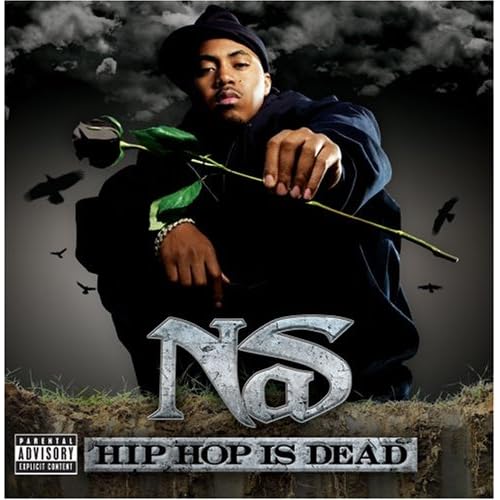This edition begins with a rapper from New York most famous for his tales of street life who has evolved in the 21st century to become an elder statesman of sorts about hip-hop music in general.
Nasir Jones spent the early 1990s getting out of the troubles of street life to create one of the most universally beloved albums in rap history in 1995's Illmatic. Everyone from those who knew Nas's streets to craggy old white critics loved the true grit that Jones showed in his unflinching portrayal of the very street life he escaped. In fact, they loved it so much that every album since then has more or less been compared -- often unfairly -- to his masterwork. Even records as culturally important as 2006's Hip Hop is Dead or his most recent stand for the issue of racism on 2008's Untitled has gone under fire for Nas not being like Nas.
Ultimately, the argument seems moot. While Nas has his pulse on the streets of Queens, a man earning the money and living the lifestyle that Mr. Jones does can't simply go back again to the stories he made famous in 1995. Unlike many rappers who claim that they lived the harsh lifestyles of America's roughest streets, Jones has the pedigree to back it up. So to suddenly revisit a different time period would be not only pandering to the people who want to hear what their version of Nas is, but that it would be disingenuous considering what we all know about Nas right now.

This is why his "elder statesman" releases, specifically the aforementioned Hip Hop is Dead and Untitled, are evidence of why Nas is one of the best currently active rappers in the genre right now.
Both releases examine topics that Nas faintly covered on Illmatic, but never really gave much thought at the time in using such a massive platform to talk about these topics. Hip Hop is Dead is a lament about the ridiculous commercialization of the genre, to the point that groups like D4L, Dem Franchize Boyz, and Soulja Boy have had steady careers in the genre, while artists "with a legacy" like KRS-One have struggled to keep up in terms of sales.
Video for "Hip Hop is Dead."
Thus Nas, one of the few veterans of hip-hop suddenly not washed away by the genre's changing tide, feels fit to comment on what made the genre intriguing in the first place and in turn reviving the idea of "intelligent mainstream hip-hop." Keep in mind that less than a year after the album's release that Kanye West's Graduation had the biggest opening week sales of any hip-hop record in nearly five years, though, that later was toppled by Lil' Wayne's The Carter III a mere few months later. And of course, that same year also saw the ridiculous craze of "Crank Dat," so the genre has a ways to go but artists like El-P, Aesop Rock, Sage Francis, Saul Williams, and even the more mainstream Lupe Fiasco have breathed creativity into hip-hop in the 21st century.

Untitled, meanwhile, is an entirely different beast. To know the true essence of the album's message, you must remember the album's original title, which was to be called the N-word. Nas here digs into every element that divides ethnicities in general, from the mostly incorrect stereotypes that divide black people and white people to the fact that his race still holds up the N-word as significant (which it is) when he feels that positive reinforcement means that the word could just as much be like any other word in the English vernacular. But before the listener gets the idea that this is all about attacking racism and dissecting what one word has done to stereotype a race of people, Nas takes another left turn. He talks about the culture of equality for all races, the idea that America is potentially as savage as any other region in the world if the people don't discover a sense of unity, as shown in "America."
Video for "Hero," a single from Untitled.
With this in mind, Untitled is easily the strongest release Nas has made since Illmatic. That's always a bold statement to make, but there's a sense of importance that was made apparent through most of Hip Hop is Dead and nearly all of Untitled. Not to mention that Nas' Achilles heel of less than stellar musical backing is solved by taking in fine producers like Polow Da Don and stic.man and having them simply work their magic.
While there isn't a credible defense to all of his work, which is to say that Street's Disciple, God's Son, Stillmatic, and I Am... all have good tracks but aren't amazing records (and the less brought up about Nastradamus the better), this isn't an excuse to pass off Nasir Jones's hip-hop career. In as much as I love early 1990s hip-hop and Illmatic's amazing stories, there is a lot more to Nasir Jones than a good album of street slang. There is a fully realized dynamo that has delivered a solid body of work, even if the middle albums are the nadir that eventually has risen back up. Not to mention that Nas has even "beaten" his comtemporaries in quality tracks, because let's be honest. Nas's "Ether" is such a better song than Jay-Z's "Takeover."
And even as he grows older and wiser, I don't really think Nas will ever stop being as blunt as he's been since day one. After all, that's unlike the guy who wrote about his own New York state of mind to stop having his own opinion.
(Album art courtesy of Amazon.com and Def Jam Records.)

No comments:
Post a Comment